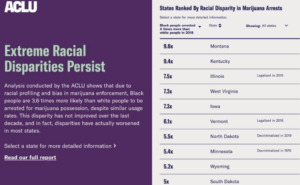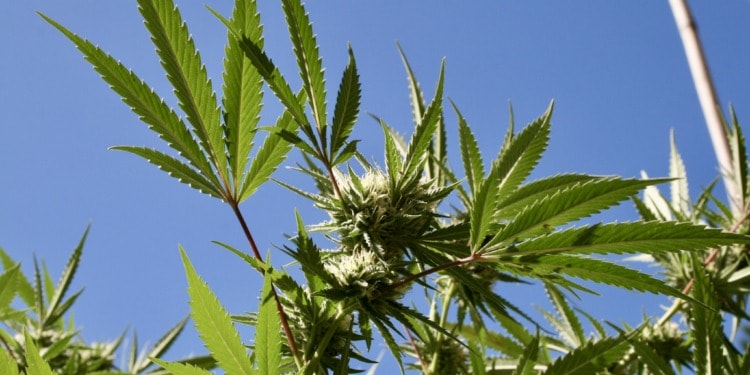On Thursday, United States President Joe Biden announced pardons for federal-level, simple marijuana possession — one of the first efforts on his part to decriminalize marijuana, a substance in America which is already legal in 19 states.
Yet the number of arrests for simple marijuana possessions concerns tens of thousands of Americans. In 2020 alone, over 350,000 people were arrested and some sources have put the number of arrests for “marijuana offenses” at nearly 16 million in the past two decades.
The move could eventually lead to a change in the federal classification of the drug which is currently considered “dangerous” on a par with heroin, as well as lead to pardons at the state level.
Pardons could benefit 6,500
Officials estimate Biden’s pardons could benefit 6,500 people already criminalized for small amounts of federal-level marijuana possession.
Alongside issuing pardons, the move will also make it easier for those charged to get access to education, employment and housing — basic human rights that many people with a prior record of federal conviction do not get to access easily.
The President will task the Department of Health and Human Services and Attorney General Merrick Garland to review how marijuana is classified under federal law, something that has been criticized over the years as marijuana is still considered equal to LSD and heroin as a dangerous substance federally.
Senior administrative officials note the reviewal process may take a while, as it will be based on a “careful consideration of all the available evidence, including scientific and medical information that’s available.”
However, the driving force of Biden’s decision wasn’t to legalize marijuana — Biden having wavering views on the substance — but to free criminals, particularly African Americans, who have been convicted unfairly for simple marijuana possession compared to their white counterparts for decades.
During the 2020 campaign, aides reported Biden was waiting for new studies to come out on marijuana to shift his opinion, but the continued racially motivated criminalization of small possessions led him to make the move prematurely before having his opinion about marijuana confirmed one way or the other.
His actions were also driven by timing, the November midterms coming up in just under a month, in which Biden hopes the move will appeal to particularly Black voters, young voters and Democrats.
The upcoming November midterm elections are especially important as they will determine what Congress will look for in the last two years of Biden’s term. Several candidates are seeking to address the unfair criminalization of marijuana such as Pennsylvania’s Democratic Lt. Gov. John Fetterman, who is running for a State Senate seat and has made marijuana legalization a central aspect of his campaign
“It’s far past time we end the failed war on drugs and let go of this bizarre superstition and criminalization of a plant,” Fetterman said in a statement on his campaign website. He recalled that almost every state allows some form of medical marijuana, as well as 19 states and Washington DC which have already legalized weed for adult recreational use.
Colorado was the first state to recreationally legalize the drug a decade ago in 2012. However, marijuana is far from legal in the US, with more than 350,000 Americans reportedly arrested for marijuana possession in 2020. Even worse, because marijuana is still illegal under federal laws, people who are using this plant legally in their home state may still be denied federal employment.
In effort to further his agenda, Fetterman met with Biden last month to discuss the criminalization of marijuana, something that may have encouraged Biden to make the move.
Despite the progress, little efforts have yet to be made to decriminalize a drug that is legal to use in almost half of the country — until now.
Progress will need to continue
Although the announcement Thursday is a cause for celebration, according to BBC no one is currently in federal prison solely for marijuana possession.
The majority of persons convicted are found at the state level — a situation that will be unaffected by Biden’s actions.
According to the advocacy group Last Prisoner Project, the pardon will not apply to 3,000 people convicted of higher-level marijuana possession who are in federal prison and will leave 30,000 people still incarcerated at the state level for simple possession — a number which does not reflect total state levels.
The Last Prisoner Project reports 15.7 million persons have been arrested for marijuana offenses in the past two years — black people 3.64 times more likely to get arrested for possession than white people.
In states where marijuana is both legal and illegal, black people are still more likely to get arrested for possession over white persons.
In order to check these striking differences, the American Civil Liberties Union (ACLU) created a tool to show people how discriminatory marijuana offenses play out between states.

The chart shows that Montana is the leader, with black people being 9.6 times more likely to be arrested for marijuana and Kentucky following suit with a rate of 9.4.
Strikingly, the data further shows that Colorado, a state where marijuana possession has been legal for 10 years and where discriminatory rates are the lowest in the country, still has black people 1.5 times more likely to get arrested.
Clearly, there is an evident problem in America — no doubt deriving from the war on drugs, a problem which has spanned decades.
However, Biden’s decision Thursday is still just a small step toward reversing decades of unfair treatment — something which will hopefully open up doors to further marijuana decriminalization and fewer restrictions on a plant that is used and praised for its healing properties.
Editor’s Note: The opinions expressed here by Impakter.com columnists are their own, not those of Impakter.com –In the Featured Photo: Cannabis cola leaves on September 21, 2017. Source: Brian Shamblen, Flickr.








